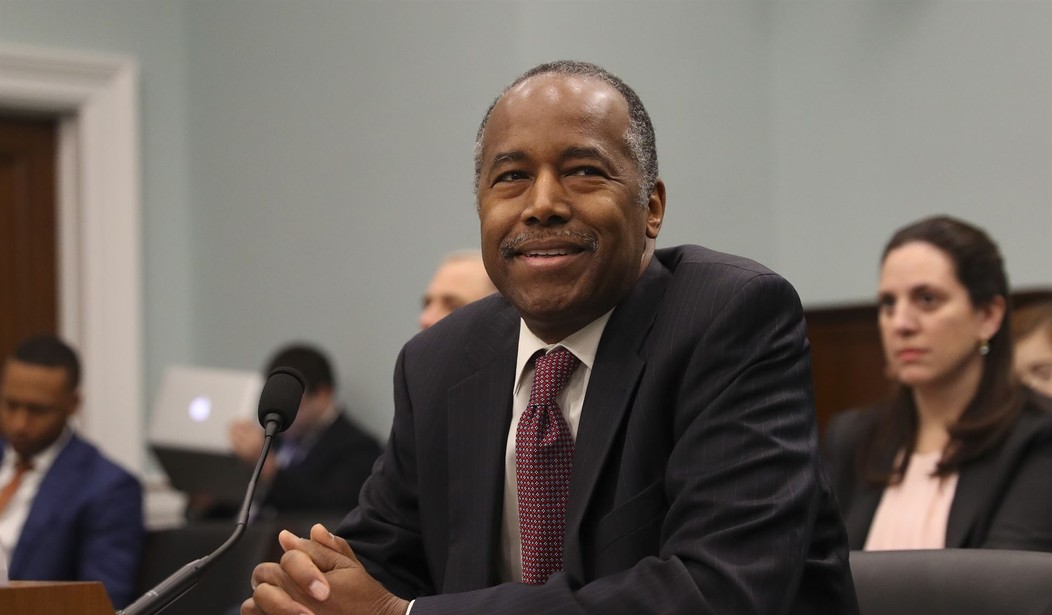Washington, D.C. – Housing and Urban Development Secretary Ben Carson spoke at a roundtable to introduce an “EnVision Center” in Southwest, D.C. Tuesday morning. This center is one of 17 such centers across the nation aiming to put all the tools to help HUD-assisted families achieve self-sufficiency in one place.
Carson explained Tuesday that these centers will be largely community-based and will collaborate with non-profits and local government to ensure that each community’s unique needs are addressed.
“This is an endeavor that is community-based,” Carson emphasized, “providing an opportunity to take federal, state, and local resources, combine them with the private sector with the faith-based organizations, and with all of those who are really, truly interested in moving people forward.”
As HUD has rolled out these EnVision Centers in the past month, Carson said that he has spoken with residents of these communities.
“In some cases what I discovered is that people don’t see themselves as ever amounting to anything,” he lamented. “They’re being taken care of, their mother was being taken care of, their grandmother, and they don’t see any difference for themselves. That’s not their fault, it’s the fact that that’s all they’ve been exposed to so what we have to do is expose them to something else.”
He characterized the center as “being able to see beyond what you can see, as my mother used to always say.”
Shernitta Jefferson, a former resident of public housing who now works for the D.C. Housing Authority, illustrated this sort of vision to the roundtable in a very literal fashion.
Jefferson held up a vision board that she had made for herself with magazine cutouts of her goals. With the help of the Family Self Sufficiency program with the District of Columbia Housing Authority, she was able to achieve some of these goals and is now a homeowner with two children in college.
Recommended
Jefferson told Townhall that mentors holding her accountable were crucial to achieving her goals when she was a struggling single mom trying to leave public housing. She has high hopes for the EnVision Center being able to reach more people with more access to these sorts of programs.
“It’s important that they hear real-life stories and people who’ve been through it and then they can realize that they could become more than what they see right now,” she emphasized, “so we have to be able to see where they are, get their vision.”
Tyrone Garrett, the director of the D.C. Housing Authority, told Townhall that a key element of the centers will be to listen to needs of the community and address them in unique ways.
“What I’ve been seeing is that it’s not one size fits all,” he said, “and we need to make sure we have programs that actually take residents to where they want to be in terms of self-sufficiency. It may be someone participating in a homeownership program but it also may be someone who was doing a workforce development program that allows them to gain skills and training or maybe someone who just says hey, I want to get back into school, we provide that particular service.”
He said Carson’s designation of the EnVision Center “brings other stakeholders to the table that normally weren’t aware of us,” adding, “this is an opportunity for us to be very creative and bring other partners to the table.”
Carson told Townhall following the roundtable that tracking the outcomes of those served by the EnVision Centers is “critical.”
“We always want to have evidence so we’re developing a dashboard and we’re working with multiple different agencies,” he said, “In terms of educational advancement the data’s already being collected by the Department of Education, the Department of Labor is already collecting so the information is already there, it just needs to be collected and coordinated and digested the right way.”
Carson said the metrics that will be monitored have to do with the four pillars the project is grounded in: Economic Empowerment, Educational Advancement, Health and Wellness, and Character and Leadership.
“For education, for example, we’re going to be looking at the grade reading level,” he explained. “We’re going to be looking at high school completion, GED completion, advanced degree completion.”
Carson also answered questions about concerns over rent increases in HUD’s recent proposal for rent reform.
He said that in his discussions over these increases people “don’t get totally concerned about that because they realize that’s just the beginning of a conversation about being able to sustain these programs and most people are actually thrilled about the fact that we’re talking about maybe doing income verification every three years so that now they can increase their income without penalty.”
Carson added that the proposed reforms would give people “much more flexibility in terms of what kind of rent structure they have and that would simplify the system considerably.”
“All these kinds of things have to be looked at in conjunction,” he emphasized, “we have to work with lots of different people and we have to get the input from the residents and we have to have something that works for the people not something that is dictated from the government.”

























Join the conversation as a VIP Member